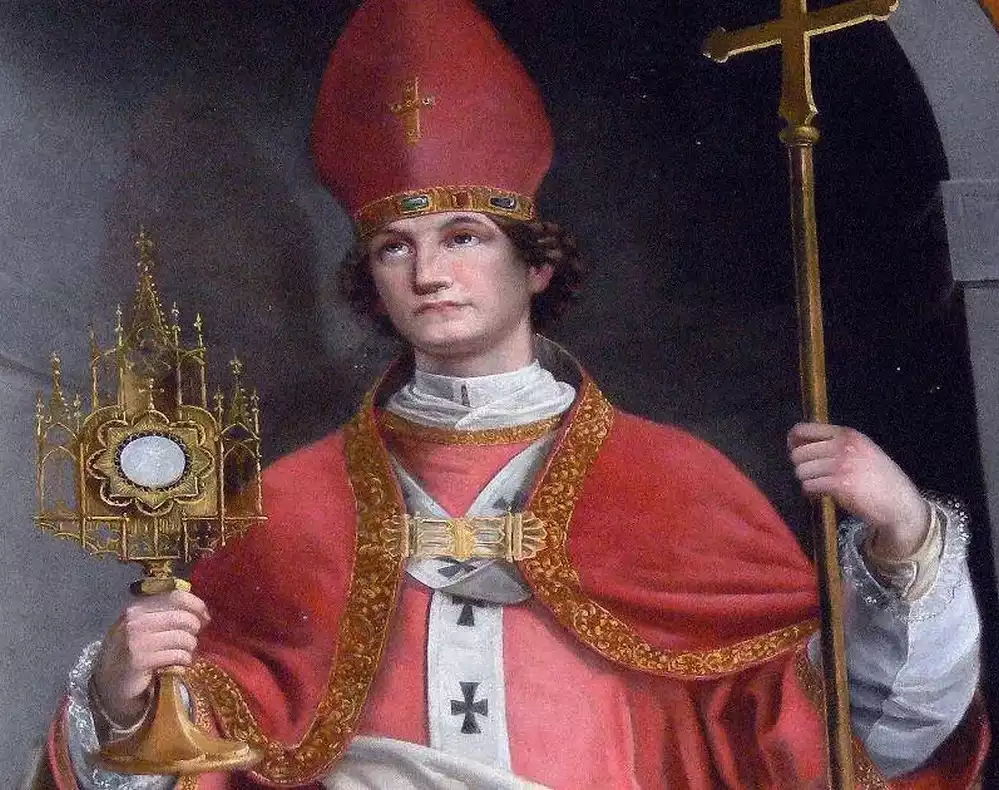
Among ecclesiastical history’s luminaries, Saint Norbert of Xanten beams exceptionally bright. His life, commenced circa 1080 and concluded in 1134, testified to spiritual metamorphosis and devotion. As founding father of the Premonstratensian Order, Norbert was a reformist luminary, radiating intense zeal for church renewal. His enduring legacy, profoundly ingrained within Christian spirituality’s fabric, persists in steering and uplifting souls toward purposeful piety. Let us explore the edifying tale of this saint, charting the trajectory of his ineffaceable sway.
The Awakening – From Courtier to Clergy
In the vibrant tapestry of medieval Europe, the early life of Saint Norbert of Xanten unfolded amidst the opulence of the imperial court. Born into a noble family, his youth was marked by luxury and privilege. However, the divine had other plans for this son of fortune. A profound spiritual awakening was set to steer Norbert’s life onto a radically different course, one paved with piety and purpose.
Norbert’s conversion was as dramatic as it was decisive. A near-fatal accident during a thunderstorm served as the catalyst for his metamorphosis. As the story goes, a bolt of lightning struck close to Norbert, jolting not just the ground but the very foundations of his soul. This harrowing brush with death ignited a flame of profound spiritual fervor within him. With newfound resolve, Norbert of Xanten shed his worldly trappings, renouncing his noble title and earthly wealth. He embraced a life of asceticism, seeking solace and guidance in the seclusion of the clergy.
This pivotal transformation marked the beginning of Norbert’s remarkable journey in the service of the church. His commitment to ecclesiastical reform and spiritual rejuvenation was unwavering. Driven by a vision of a purer, more devout church, he traversed the countryside, preaching with an ardor that could ignite the most indifferent of hearts. His words, imbued with sincerity and fervor, reached deep into the souls of his listeners, awakening a collective longing for spiritual renewal.
As Norbert of Xanten continued his pilgrimage of faith, his influence grew, drawing followers from far and wide. These were the early seeds of what would bloom into the Premonstratensian order, a community united by a shared commitment to Norbert’s ideals of reform and piety. Yet, as the dawn of the Premonstratensian era approached, Norbert’s journey was far from over. His vision, though coming into clearer focus, still had many challenges to surmount and triumphs to achieve.
The Legacy of Norbert of Xanten
In the evolving narrative of Saint Norbert of Xanten, the establishment of the Premonstratensian order stands as a monumental chapter, a testament to his enduring vision for a church imbued with purity and devoutness. The order, rooted in Norbert’s transformative ideals, emerged as a beacon of spiritual renewal, a light guiding the faithful towards a more profound understanding and practice of their faith.
The genesis of the Premonstratensian order was marked by an unyielding commitment to the principles of communal living, prayer, and apostolic labor. Norbert’s charisma and fervent dedication attracted a like-minded community of followers, men and women drawn to his message of reform and his model of ascetic living. In the valley of Prémontré, a secluded retreat in the heart of France, Norbert laid the foundation of his order, setting in stone the principles that would guide his followers for centuries to come.
The order flourished under Norbert’s guidance, growing in numbers and in spiritual influence. Its members, known for their white habits, became a symbol of the purity and austerity that Norbert cherished. They lived in strict adherence to the rule of Saint Augustine, devoting themselves to the service of God and the community. Their days were a rhythmic cadence of prayer, contemplation, and work, an embodiment of Norbert’s vision for a balanced, devout life.
Norbert of Xanten’s legacy, however, was not confined to the cloistered walls of monasteries. His reformative zeal extended beyond, reaching into the very heart of the church’s hierarchy. Appointed as the Archbishop of Magdeburg, Norbert took on the daunting task of spiritual and administrative reform. His tenure in this pivotal role was marked by a series of challenges and triumphs, each a stepping stone towards the realization of his vision for a church that mirrored the apostolic purity and dedication of the early Christian community.
As Norbert’s journey unfolds, the indelible impact of his life and work becomes increasingly evident, painting a picture of a man whose legacy was as profound as it was enduring. His story, a tapestry of faith, determination, and spiritual zeal, continues to inspire and guide, echoing through the annals of ecclesiastical history.
Saint Norbert of Xanten’s legacy is a mosaic of fervent faith, rigorous reform, and unwavering dedication. His life and the establishment of the Premonstratensian order reflect an unyielding commitment to spiritual purity, leaving an indelible mark on Christian history.
References
Brown, P. (2003). The Rise of Western Christendom. Oxford: Blackwell Publishing.
Davies, N. (2011). Europe: A History. New York: Harper Perennial.
Leclercq, J. (1992). The Love of Learning and The Desire for God. New York: Fordham University Press.
Swanson, R. N. (2008). Religion and Devotion in Europe. Cambridge: Cambridge University Press.
